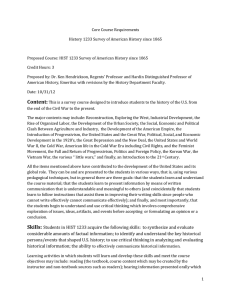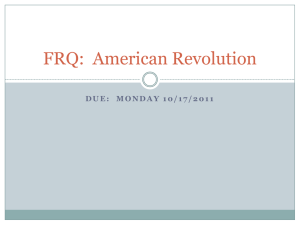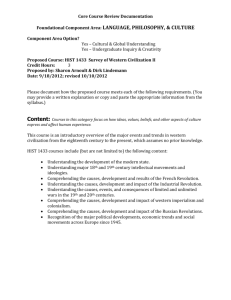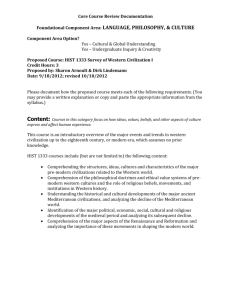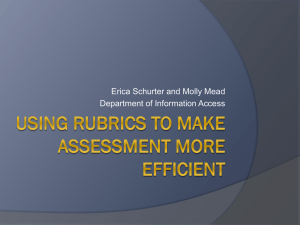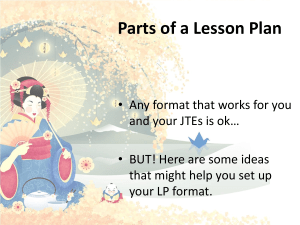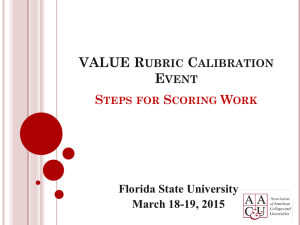thinking essays
advertisement
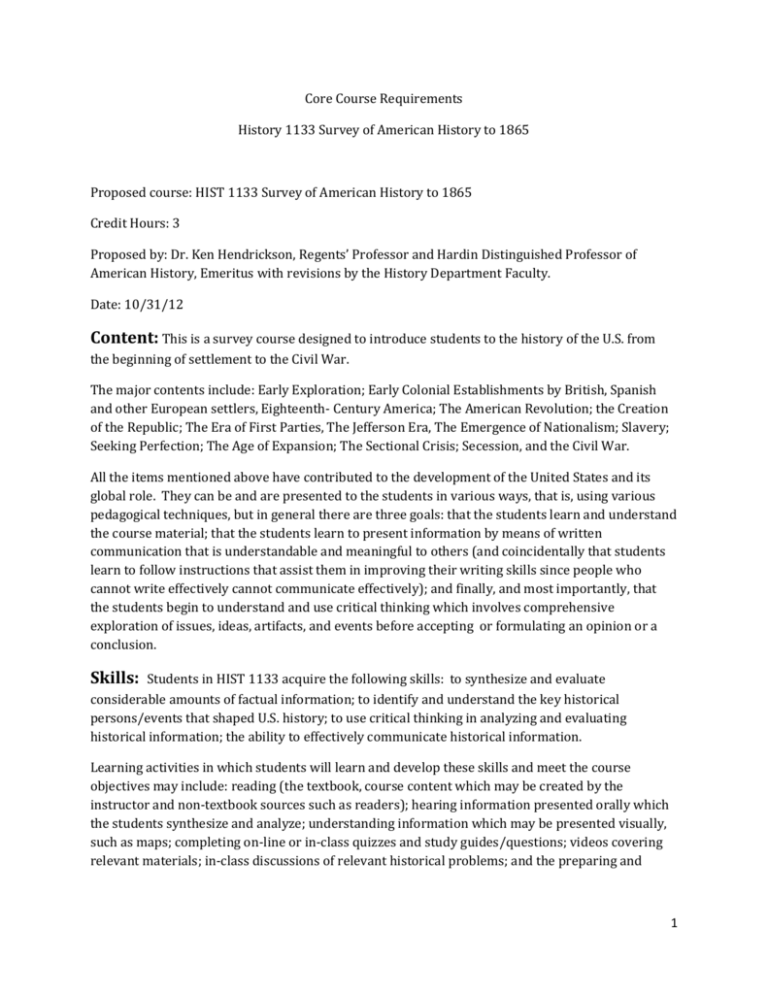
Core Course Requirements History 1133 Survey of American History to 1865 Proposed course: HIST 1133 Survey of American History to 1865 Credit Hours: 3 Proposed by: Dr. Ken Hendrickson, Regents’ Professor and Hardin Distinguished Professor of American History, Emeritus with revisions by the History Department Faculty. Date: 10/31/12 Content: This is a survey course designed to introduce students to the history of the U.S. from the beginning of settlement to the Civil War. The major contents include: Early Exploration; Early Colonial Establishments by British, Spanish and other European settlers, Eighteenth- Century America; The American Revolution; the Creation of the Republic; The Era of First Parties, The Jefferson Era, The Emergence of Nationalism; Slavery; Seeking Perfection; The Age of Expansion; The Sectional Crisis; Secession, and the Civil War. All the items mentioned above have contributed to the development of the United States and its global role. They can be and are presented to the students in various ways, that is, using various pedagogical techniques, but in general there are three goals: that the students learn and understand the course material; that the students learn to present information by means of written communication that is understandable and meaningful to others (and coincidentally that students learn to follow instructions that assist them in improving their writing skills since people who cannot write effectively cannot communicate effectively); and finally, and most importantly, that the students begin to understand and use critical thinking which involves comprehensive exploration of issues, ideas, artifacts, and events before accepting or formulating an opinion or a conclusion. Skills: Students in HIST 1133 acquire the following skills: to synthesize and evaluate considerable amounts of factual information; to identify and understand the key historical persons/events that shaped U.S. history; to use critical thinking in analyzing and evaluating historical information; the ability to effectively communicate historical information. Learning activities in which students will learn and develop these skills and meet the course objectives may include: reading (the textbook, course content which may be created by the instructor and non-textbook sources such as readers); hearing information presented orally which the students synthesize and analyze; understanding information which may be presented visually, such as maps; completing on-line or in-class quizzes and study guides/questions; videos covering relevant materials; in-class discussions of relevant historical problems; and the preparing and 1 writing of exam essay questions and/or a paper or papers which involves critical thinking in the analysis and evaluation of material as well as clear and effective communication. Assessment of Core Objectives Critical Thinking Skills: The Faculty provides the students with the context, that is, the historical, ethical, political, cultural, and environmental circumstances and/or conditions that may have affected the outcome of a given event. This is done by various means: lecture, discussion and reading of both the textbook and course content provided by the instructor. Students apply critical reasoning skills by synthesizing, evaluating and analyzing the material that has been presented to them, with a particular emphasis on cause and effect and/or comparison and contrast. Critical Thinking Skills are demonstrated through essays that reflect an understanding of the course content and an ability to analyze the historical relevance of important events, people, and trends. Such essays are at times included in exams but may, however, be an independent assignment. A learning activity that might develop this skill would be to have students realize that another outcome was entirely possible and the future might have been entirely different. They are encouraged to think—“What would I have done? Why?” This leaves the door open to other learning activities and ways of demonstrating the critical thinking skills. Assessment of Critical Thinking Skills, faculty will rely on the AACU Critical Thinking VALUE Rubric. Communication Skills: History classes have an emphasis on written communication, both in reading and writing. Even when information is presented orally or visually, students are expected to analyze and synthesize this information in order to later successfully pass exams. Exams usually include essays that require the students to write brief essays that reflect the use of critical thinking as well as clear written communication skills; however, even if not part of an exam, all students submit for a grade at least one such essay. These questions require both critical thinking and written communication skill. For example: “Given the context in which he was forced to make decisions in battle, should George Washington be judged as a great, mediocre, or poor field commander?” Why?” In assessing Communication Skills, faculty will rely on all but the third row (“Genre and Disciplinary Conventions”) of the AACU Written Communication VALUE Rubric. The third row will be used if it is relevant to the assignment. Personal Responsibility: In the context of a history course, students learn how people of the past made decisions based upon their ethical values and the context in which they lived. Assessment of students’ awareness of these decisions, why they were made, and their results will be made through questions specifically addressing them. For example, “How was slavery both denounced and defended in the decades before the Civil War?” All students submit at least one essay assignment, whether an examine element or stand alone assignment, that exhibits an understanding of the social context of the human condition and the ethical issues associated with such. 2 Faculty assessment of student’s consideration of ethical decision-making in an historical context will rely on the departmental Assessment for Personal Responsibility Rubric that measures a student’s ability to assess “the social context of problems [and] recognize ethical issues in a variety of settings.” Social Responsibility: This rubric defines course material contributing to social responsibility as: intercultural competence, knowledge of civic responsibility, and the ability to engage effectively in regional, national, and global communities. There are many aspects of HIST 1133 which relate to this, including but not limited to: encounters between Europeans, Native Americans and Africans, the immigrant experience, regional differences, the experience of African-Americans and the issues that led to the Civil War. Faculty will identify course material relevant to this rubric and assess students on it (either through exams or other assignments.) All students submit at least one essay assignment, whether an examine element or stand alone assignment, that exhibits an understanding of the complexity of various cultures, their politics, economy, values, and beliefs. Faculty will assess the students’ level of intercultural competence by using the second row (“Knowledge”) of the AACU’s Intercultural Knowledge and Competence VALUE Rubric. Additional Information In this survey course some of the faculty use tests that are in part multiple-choice and in part essay. Others use tests that are made up entirely of essay questions. Others may rely primarily on objective item exams, particularly in on-line courses, but in every section of this course, the student completes at least one written essay. In either at least one essay is set up in such a way as it can be assessed by one or more of five rubrics listed above. Each of the rubrics contains four levels of achievement. The first level is known as Benchmark. It is the lowest level that can produce a passing grade on the question at hand. Levels two and three are known as Milestones and their contents, or parts thereof, represent good work. The fourth level is known as Capstone and represents excellent achievement. The students are graded accordingly on these questions. Students are reminded that because history deals with the past, some of the wording, indeed most of it in some of the rubrics, must be converted to past tense in order is make sense. Most students do not find this difficult to understand. Attached: 1. Sample Syllabus 2. Critical Thinking Value Rubric 3. Written Communication Skills Rubric 4. Intercultural Knowledge and Competence Value Rubric 5. History Department Personal Responsibility Assessment Rubric 3
